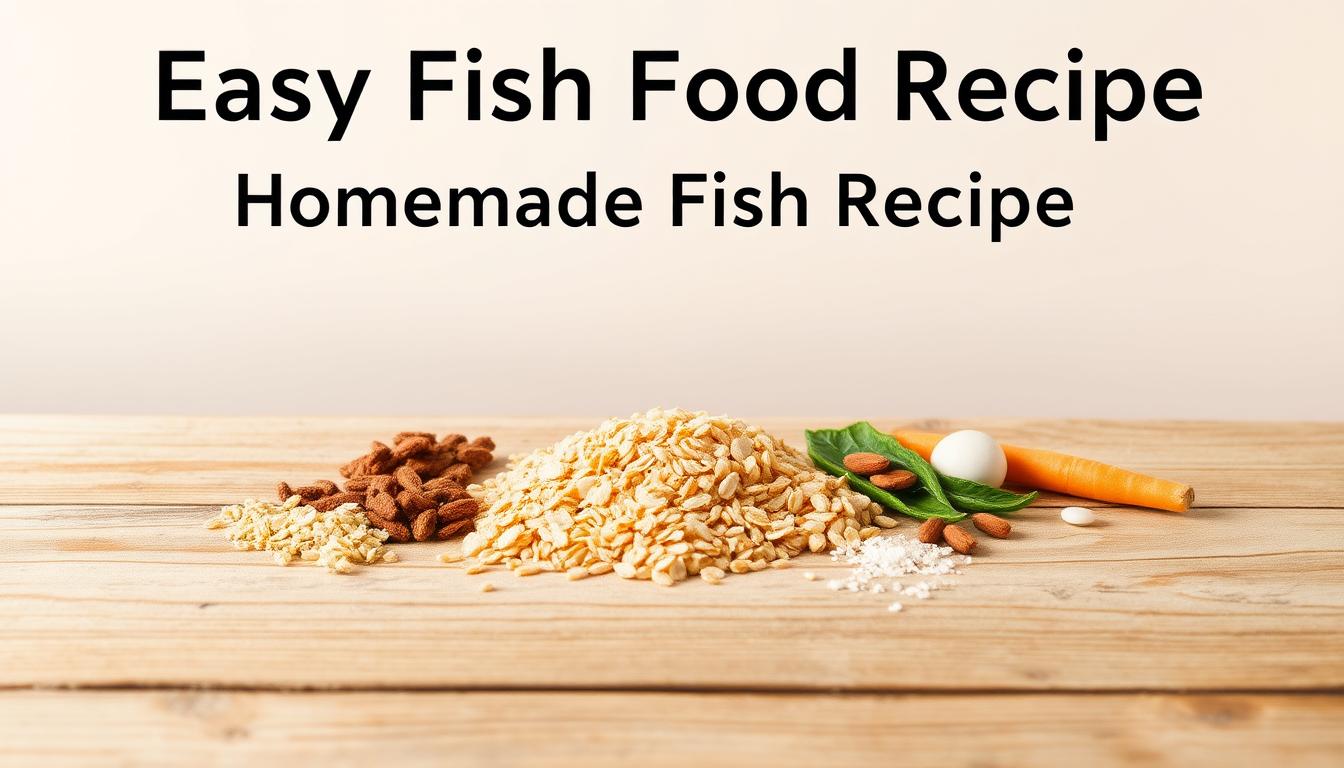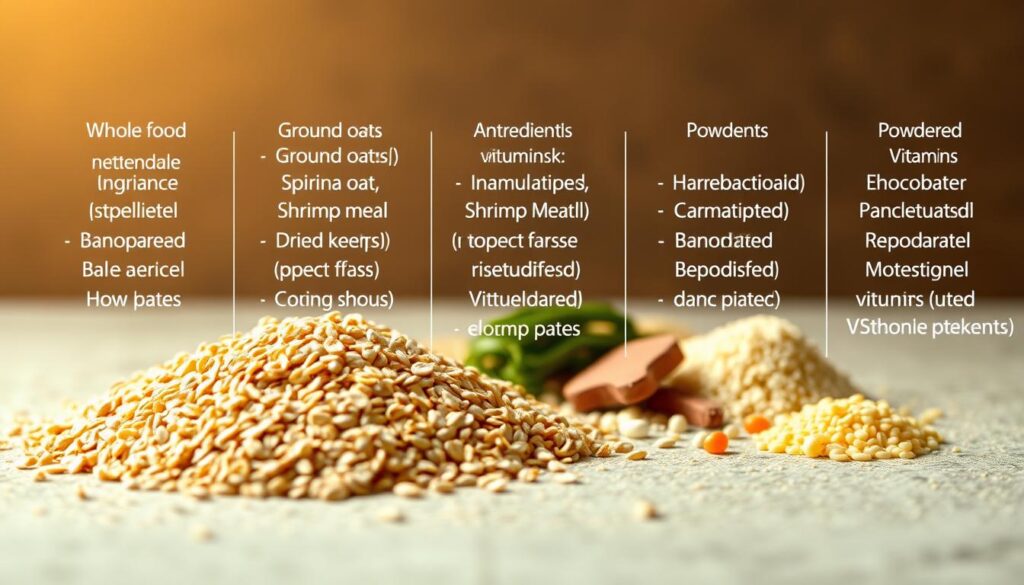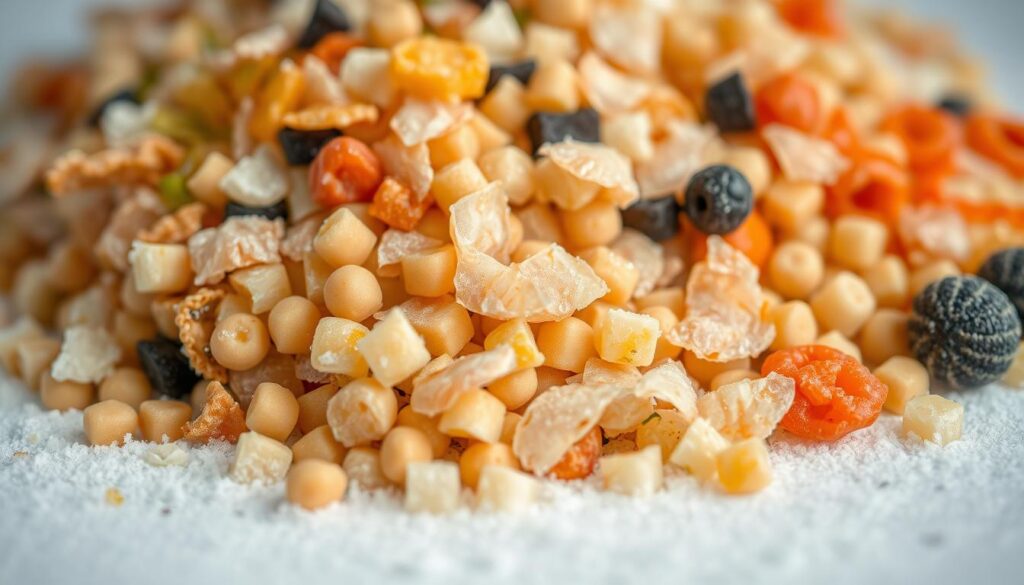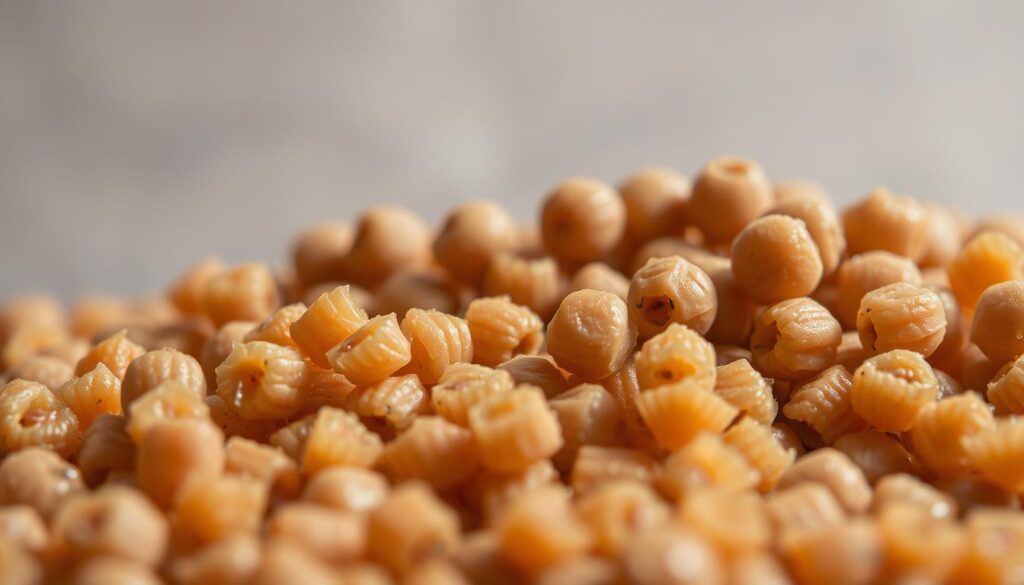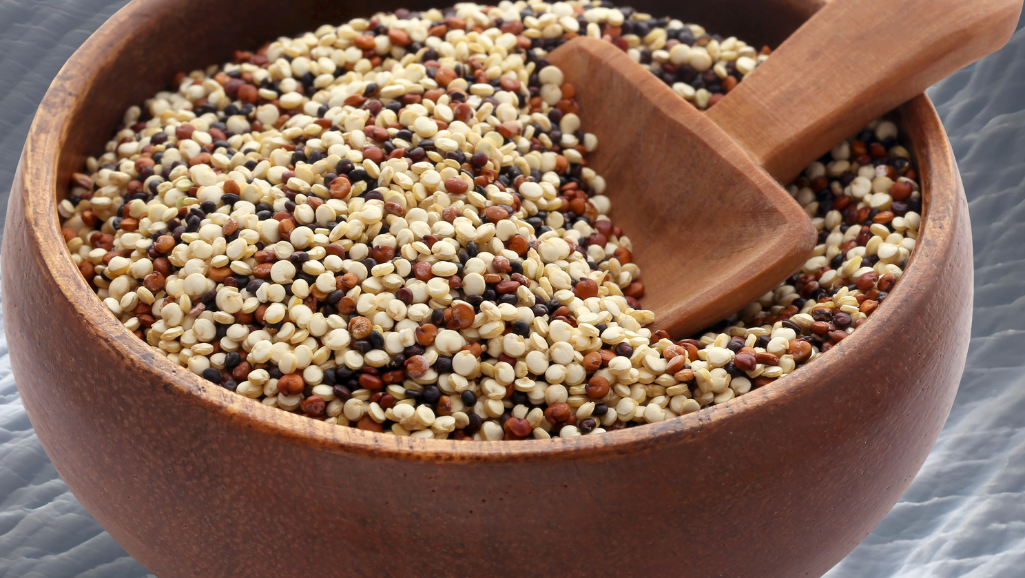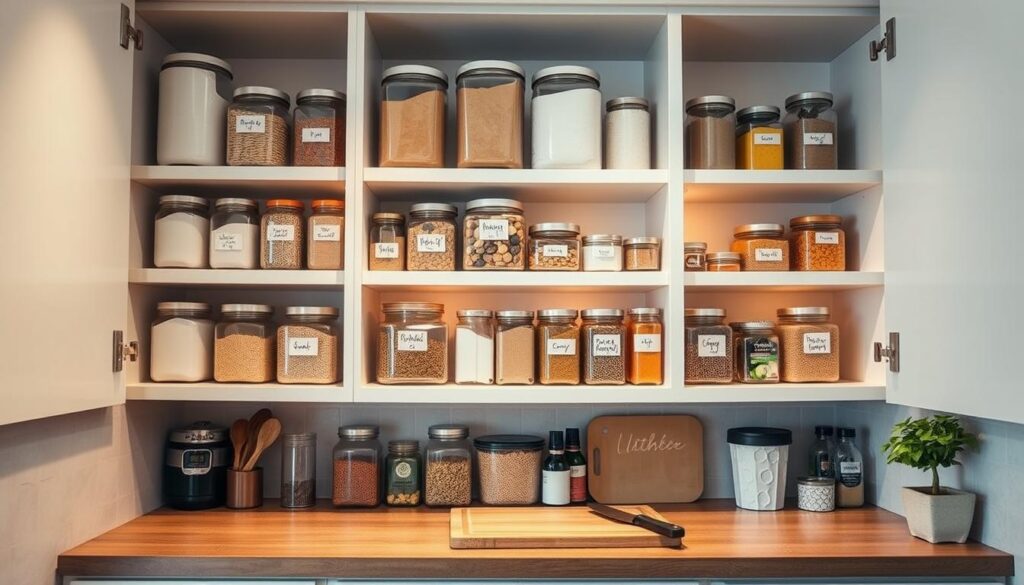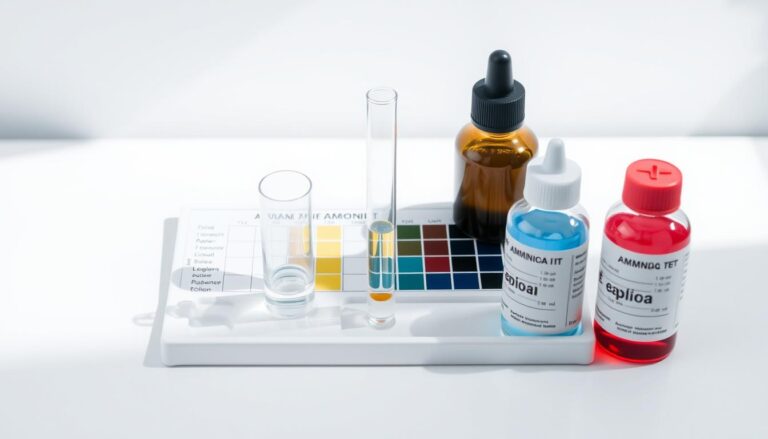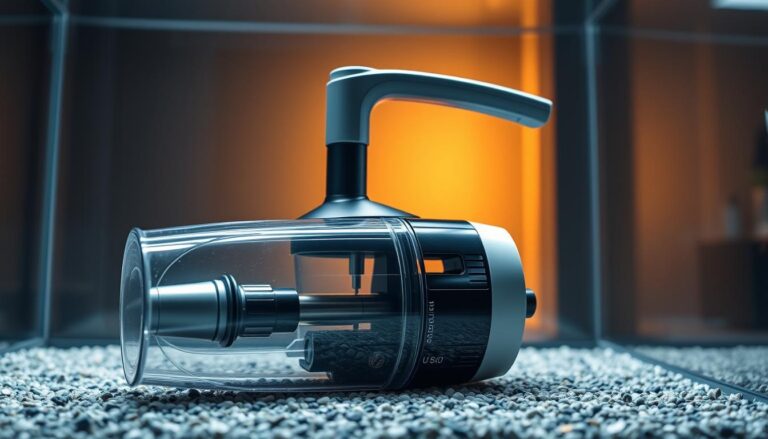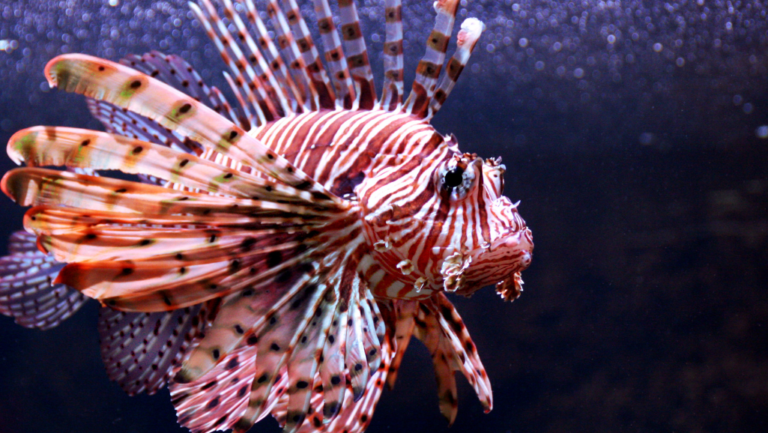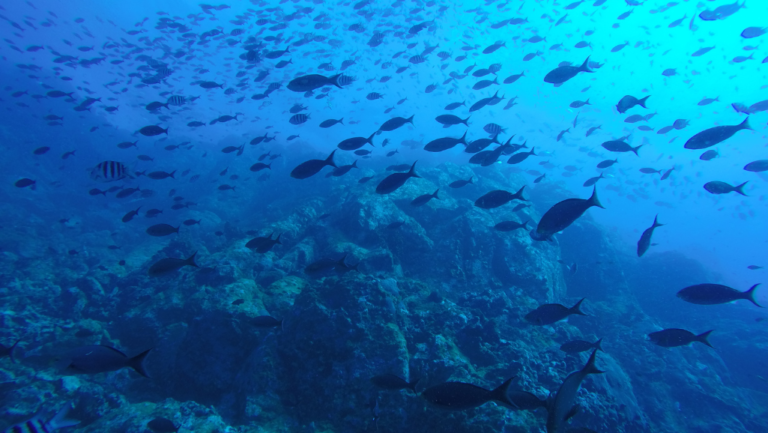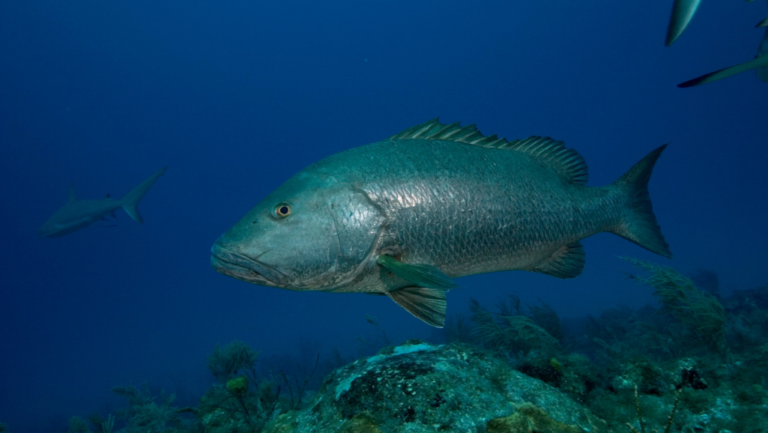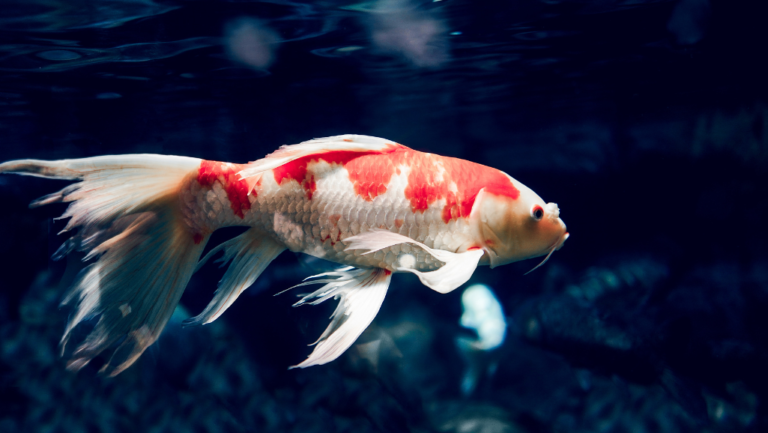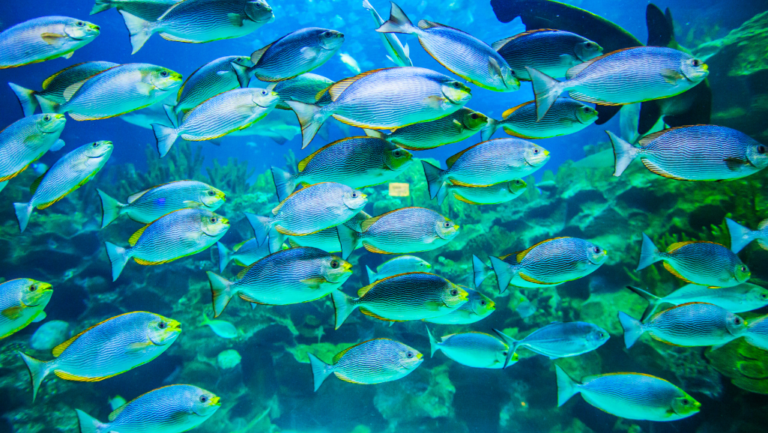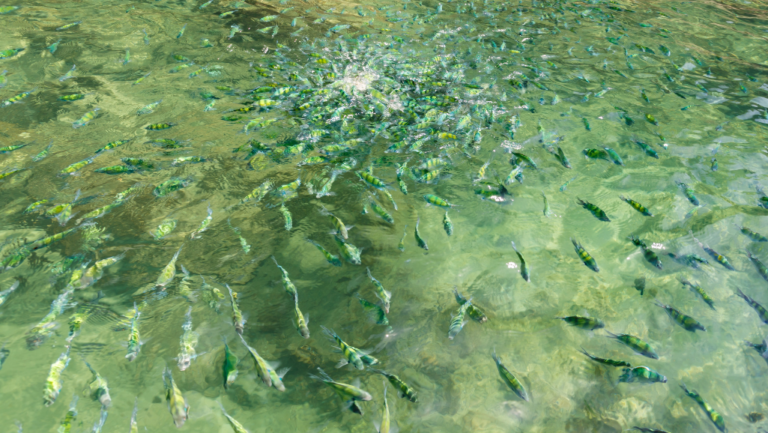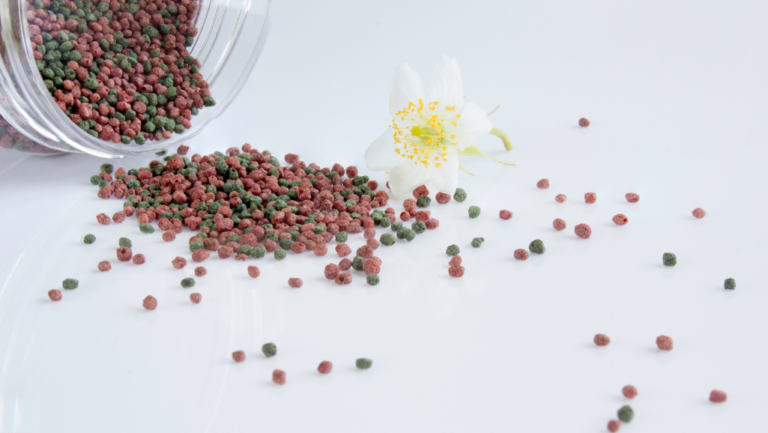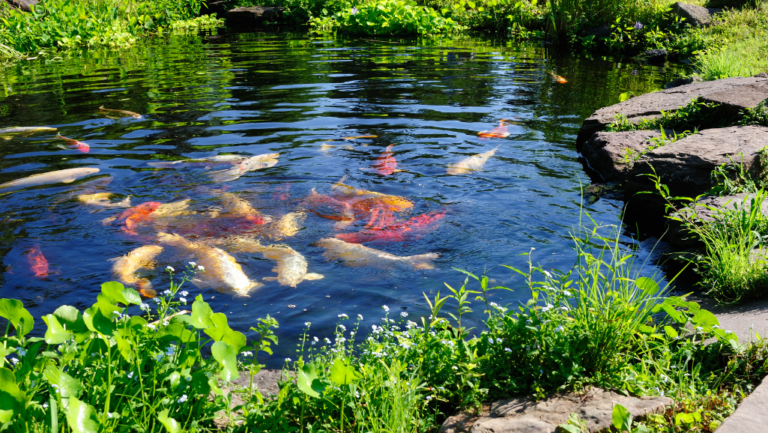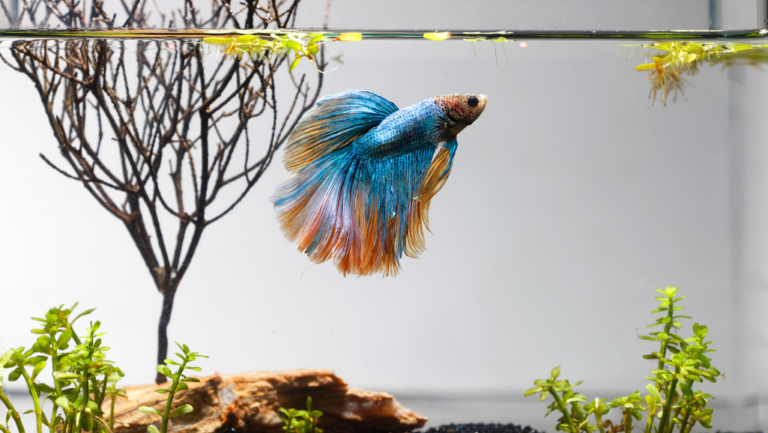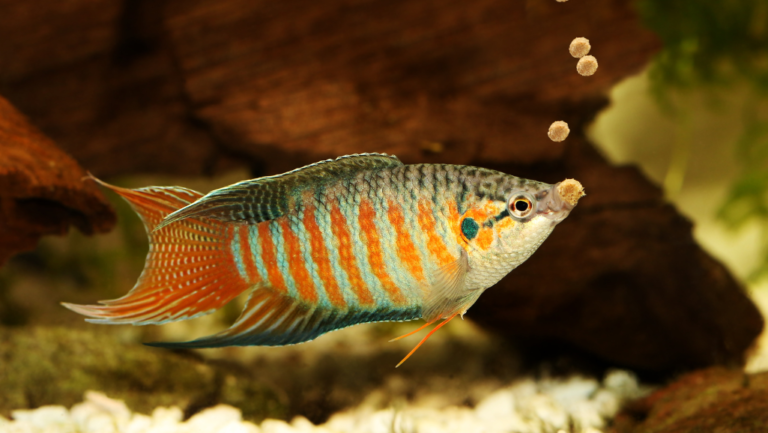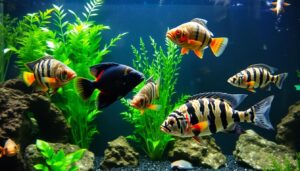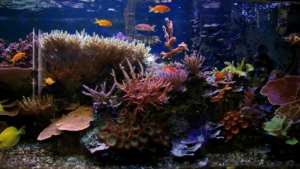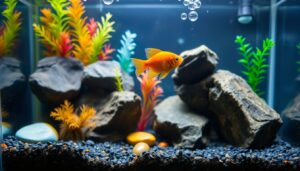Save money and gain control over what goes into every bite. This short guide shows how one simple recipe made at home turns into weeks of convenient, high-protein portions that thaw fast and feed all tankmates.
In a single prep session you will learn a method that yields uniform pellets and slabs. They are easy to break off, label, and store so your feeding routine takes less time and produces clearer water.
Combine lean protein like salmon with algae and a binder for balanced fats and minerals. The goal is better color, steady growth, and lively interest at feeding time — without oversized chunks or soggy mixes.
Two proven approaches—a frozen processor mix and high-protein gel pellets—let you choose what fits your kitchen and schedule. By the end, you’ll have practical steps for batching, labeling, and rotating varieties for steady success.
Key Takeaways
- Fish Food Recipe.
- Make a single homemade mix that yields weeks of ready portions.
- Use protein plus algae to balance nutrients and flavor.
- Prep in minutes with basic kitchen tools and clear storage tips.
- Choose between frozen processor slabs or gel pellets to match your routine.
- Label and batch to avoid waste and speed daily feeding tasks.
Why Make Fish Food at Home Today
A single batch made in your kitchen can replace several store-bought packs and cut weekly costs. That simple change gives you control over ingredients, portion size, and nutrient balance.
Save money while feeding a varied, balanced diet
DIY mixing reduces cost compared with buying multiple frozen packs from a local shop. Flattened, labeled bags store well and provide easy break-off portions that last weeks.
Cut prep time and keep dinners “ready in minutes”
Consolidate prep into one short session. Then daily feeding is truly ready minutes—fast thaw, consistent portions, less cabinet clutter.
- Lower cost: collapse many branded packs into one balanced blend.
- Full control: choose clean proteins, algae, binders, and boosters for the right protein mix.
- Simplify care: one labeled bag makes vacations and caretakers easy.
- Scaleable: start quick easy, then refine with salmon or other premium proteins.
Understanding Your Fish: Herbivores, Omnivores, Carnivores
Start by identifying mouths and habits. Match particle size and texture to species behavior so timid grazers and bottom dwellers access their share every time. Small mouths need fine, suspended bits; larger species accept coarser chunks.
Categorize your stock—herbivores require more algae and plant inputs, omnivores do best on balanced blends, and carnivores benefit from dense meat and small fillet pieces. Raise the protein level to 55–65% dry weight for growth and color, using clean sources like canned salmon, white fish, shrimp, or krill meal.
- Particle and texture: suspend or sink slowly to match mid-water or bottom feeders.
- Meat choices: include canned salmon, lean fillet cuts, shrimp, or krill meal for amino-acid balance.
- Keep it simple: a core meat plus algae base, then tweak for juveniles or breeding adults.
Avoid problematic ingredients that harm health or water quality—skip spinach and brassicas and do not rely on garlic to boost intake. Observe feedings, then refine the next batch. For a concise primer on feeding types, see omnivores, herbivores, and carnivores.
Tools You’ll Need in the Kitchen
Make batching simple by gathering a few reliable tools before you start. A tidy station saves minutes and keeps flavor clean during cooking and prep.
Core gear: rely on a sturdy food processor for clean chopping of semi‑frozen ingredients without adding liquid. Keep a blender for gel mixes or fine purees when binders must blend smoothly.
Use zip‑top bags pressed flat for space‑saving freezer storage. Thin slabs or candy molds make uniform cubes that thaw in minutes and distribute well in the display.
“Process semi‑frozen components with no added liquid to maintain texture and portion easily.”
- Label bags with date, particle size, and target species.
- Dedicate a cutting board and knives to seafood-only prep for hygiene and flavor protection.
- Thaw a cup of portions in a small cup with tank water — avoid microwaves that change texture.
Stage bowls for meats, algae powders, binders, and oils. Keep a marker and tape by the freezer and plan zones for everyday slabs versus special blends. Turn off the return pump during feeding to keep portions in the display for better uptake.
Smart Ingredient List for a Nutritious Base
Build a reliable base by choosing a few nutrient-dense ingredients that scale easily for weekly batches. Keep the list focused so every batch meets protein and pigment goals with minimal fuss.
Proteins to start with
Use a high-protein core: canned salmon, white fillet cuts, shrimp, squid, or krill meal. One practical batch uses 1 lb meat (canned salmon recommended).
Plant matter and pigments
Add 1–2 oz dry algae (spirulina or chlorella) for micronutrients and color. Alternatives include peas, beans, summer squash, green beans, or zucchini for herbivores.
Binders and boosters
Dissolve 1.5 oz gelatin in 1 cup boiling water for gel pellets. Agar or pectin work as firm alternatives. Stir in 1/4 tsp astaxanthin for red/orange tones.
- Juveniles: add 1/4 tsp steamed bone meal and 3 tbsp cod liver oil unless canned salmon provides bones and oil.
- Avoid fresh spinach and strong brassicas; they can harm uptake or foul water.
- Keep the mixture simple—fewer, better ingredients give predictable results and save prep time.
fish food recipe: Two Proven DIY Methods
Decide between a chop-and-freeze approach or a hot-gel technique that gives you control over texture and shape. Each method is practical in the kitchen and aims to make portions that are ready minutes after thawing.
Frozen mixed cubes with the food processor
Method A uses a food processor to pulse semi‑frozen ingredients with no added liquid.
Flatten the mix in labeled, flat bags so portions break off fast. Thaw small cups with tank water for even distribution during dinner or quick feeding.
High-protein gel pellets and slabs
Method B blends 1 lb meat (salmon works well) with 1–2 oz algae. Dissolve 1.5 oz gelatin in 1 cup boiling water.
Blend hot to a viscous putty, spread 1/8-inch slabs or pour into candy molds. For floating pellets, fold in a little whipped cream before setting.
“Both methods rely on whole seafoods and algae to deliver concentrated protein without fillers.”
- Choose A for a quick easy mix you can portion in minutes.
- Choose B for tidy pellets, precise sinking or floating control, and higher protein density.
- Rotate methods to vary texture and encourage appetite across species.
Method A: Frozen Processor Mix for Everyday Feeding
Start by laying out chilled proteins and algae so the blades cut clean, cold pieces instead of turning everything into mush. Staging keeps texture consistent and saves time during prep.
Step-by-step: chop, pulse, and portion without adding liquid
Everything goes into the food processor while still semi‑frozen. Pulse in short bursts until you reach the desired particle size.
- Stage semi‑frozen meats (shrink‑wrapped shrimp or canned salmon) and algae so blades produce clean bits.
- Pulse, stop, and check often to avoid over‑processing the mixture into mush.
- Separate batches by particle size—coarse for large mouths, fine for small ones—then label bags clearly.
- Spread the mix thin in ziplock bags to speed freezing and make break‑off portions predictable.
- Thaw a small 1/2 cup serving in a cup of tank water for a minute or two before dinner so pieces disperse evenly.
Pro tip: process ingredients semi-frozen for uniform texture
Keep bowls cold and work quickly. Use a dedicated spatula to scrape every last bit into the bags. With practice this method will take minutes and become a weekly, reliable routine that preserves protein and reduces waste.
Method B: Homemade Gel Fish Pellets with Gelatin
Make a hot, glossy putty and you’ll shape uniform pellets that thaw in minutes. This hot-mix technique locks protein and pigment into a firm, clean matrix you can portion reliably.
Exact ratios for >55% protein (dry weight): measure 1 lb (16 oz) meat — canned salmon is ideal — and 1–2 oz spirulina or chlorella powder. Dissolve 1.5 oz gelatin in exactly 1 cup boiling water and keep that hot.
Hot-mix technique
Heat the meat and algae until very hot but still manageable. Stir the dissolved gelatin into the hot mix and blend to a glossy, viscous putty. Adjust a few teaspoons of hot water if the texture needs to be wetter.
Shaping and set
Spread the putty into 1/8-inch (3 mm) slabs on flat, labeled zip bags for the fastest thaw. Use candy molds for neat cubes or shapes that portion consistently.
Floating pellets
To make buoyant pellets for surface feeders, fold in a heaping tablespoon of whipped cream right before setting. The trapped micro-bubbles create lift without harming clarity.
“Blend hot for a glossy, viscous putty that sets cleanly and holds together in the tank without clouding.”
- Measure precisely: 1 lb meat and 1–2 oz algae hit the protein target for growth and color.
- Set control: 1.5 oz gelatin in 1 cup boiling water gives predictable firmness.
- Thin slabs: 1/8-inch sheets thaw fast and break into consistent portions for dinner or quick feeding.
Shaping, Sizing, and Texture That Fish Eat Every Time
How you cut and distribute matters more than the mix — split textures so all tankmates eat well. Large hunks of gel or frozen portions are often taken by dominant swimmers. Chop and spread portions so particles reach shy mouths across the tank.
Match particle size to mouths. Prepare micro, small, and medium bits from thin gel slabs so fry, tetras, cichlids, and big mouths each get a fair share.
Keep a few bags of ultra-fine puree for small-mouthed species and grow-out projects. Save larger morsels for big cichlids and catfish, but pair those with suspended particles for the rest of the community.
- Cut slabs into micro, small, and medium bits for wide coverage every time.
- Break clumps in-tank and use the current to carry particles across the full footprint.
- Rotate white fish and mixed-seafood batches to change chewiness and scent for your favorite fish.
- Use scissors or a bench scraper to size portions before thawing for clean cuts.
- Note which textures spark activity and adjust to keep lots of mouths involved.
“Observe who dominates and tweak sizes or feeding locations to make dinner fair and lively.”
Customize by Life Stage and Goal
Tailor each batch to the age and goal of your stock so every portion serves a clear purpose. Small, deliberate tweaks make a standard mix support growth, spawning, or color without adding complexity.
Juveniles
Grow kids faster and sturdier. Add 1/4 tsp steamed bone meal and 3 tbsp cod liver oil per pound of base. These boost calcium, phosphorus, and healthy fats for strong bones and steady growth.
Skip these extras if your canned salmon already includes bones and oil.
Breeding stock
For spawners, dial fat to roughly 10–15% of dry weight. Use salmon, chicken, or beef heart, or add measured oils to hit the target. This gives breeders the energy reserves they need without excess waste.
Color and tone
Use 1/4 tsp astaxanthin per batch for vivid reds and oranges. Combine it with spirulina or marigold to balance tones. Be cautious—too much pigment can darken or shift yellows.
- Keep protein high; tweak fats and minerals for the life stage.
- Split batches: grow-out, maintenance, and breeding—label clearly.
- Test small changes and observe activity, spawn readiness, and color before scaling up.
- Lean on salmon and mild white fish fillet trimmings for oils and texture variety.
Nutritional Principles Behind the Mix
Start by calculating dry-weight protein so each batch meets the 55–65% target for growth and color.
Protein math: canned salmon gives about 13 g protein per 55 g can. At roughly 60% water, the dry portion is ~22 g, so 13/22 ≈ 59% protein by dry weight. Algae powders add concentrated protein too. Together they hit the desired protein level for steady growth.
Balancing fat, fiber, and minerals
Keep fats moderate. Energetic oils power activity and hormones, but excess fat makes waste and poor water quality.
Include small amounts of vegetable fiber to aid digestion. Whole ingredients supply minerals — bones in canned salmon add calcium and phosphorus naturally. If algae and greens are included, skip extra vitamin dumps; redundancy wastes resources.
“Efficient protein that gets eaten means less leftover nutrients and clearer tanks.”
- Use marine meat and fish fillets for clean amino profiles.
- Match texture to digestibility so animals extract nutrition without fines.
- Watch body condition, activity, and color, then tweak fats or algae next batch.
What to Avoid and What to Swap
Small changes to the ingredient list prevent big problems in the tank and keep appetite high. Choose swaps that protect clarity and health while preserving nutrition.
Skip spinach and strong brassicas
Remove fresh spinach from your shopping and mix lists. Oxalic acid in spinach can link to bloat and organ crystal issues.
Also skip kale, broccoli, cauliflower, and cabbage. These brassicas can foul water and reduce appetite fast.
No garlic or heavy sauces
Don’t rely on garlic. Sulfur compounds often make blends less palatable and aquaculture does not use it to increase intake.
Keep sauces and seasonings out. Stick to clean, raw ingredients made for aquatic diets.
- Swap in algae: spirulina or chlorella powders for color and digestion support.
- Mild veg: zucchini or green beans instead of strong terrestrial greens.
- Use marine protein: whole meat like salmon and measured binders rather than starchy thickeners.
“When an ingredient creates odd smells or film, remove it and return to the proven core.”
Storage, Labeling, and Food Safety at Home
A thoughtful storage system turns a weekend batch into weeks of quick, reliable dinners. Plan packaging and labeling so each thaw is predictable and each serving supports tank health.
Scoop finished portions into zip‑top bags, press flat, and freeze. Thin slabs freeze fast and break off clean portions you can grab in a busy kitchen.
Flatten in labeled bags for fast break-off portions
At feeding, break off a small piece and thaw it in a serving cup with tank water. Stir after ten minutes so particles disperse evenly and avoid clumps.
Mark particle sizes and species targets to rotate variety
Clearly mark each bag with date, particle size (coarse, fine, puree), and the target fish. A single batch can feed multiple tanks for over a month when rotated properly.
“Press slabs thin, label them well, and thaw only what you need — it saves time and protects water quality.”
- Press slabs thin for fast freezing and consistent portions in the kitchen freezer.
- Use a clean cup of tank water to thaw small amounts before dinner.
- Portion only what will be consumed quickly to protect water and freezer inventory.
- Keep raw and prepared items separate; follow standard home safety for seafood handling.
- Reserve utensils and cutting boards to avoid cross-contamination and off-odors.
Track outcomes: note texture, acceptance, and clarity on the label so future batches match real needs. With a short prep checklist you’ll wrap up in minutes and have reliable protein portions on hand, ready minutes after thawing.
Feeding Routine, Portions, and Tank Practices
A predictable feeding routine keeps tanks clear and livestock healthy. Set a short, consistent schedule so meals finish quickly and monitoring becomes simple. Small changes at dinner time prevent large nutrient swings and lower maintenance.
Feed what they eat in five minutes
Aim to give only enough that is consumed within five minutes. If particles remain, trim the next portion. This protects water and reduces nuisance algae.
Pause return flow during feeding
Turn off the return pump so pellets and bits stay in the display and not the sump or skimmer. It keeps the party where the mouths are and cuts waste.
Thawing: use a small cup with tank water
Thaw frozen portions in a single cup of tank water. After about ten minutes, stir briefly so pieces separate and spread evenly. Target-feed shy or slow grazers after the main group clears.
“Feed only what clears in five minutes; consistency reduces stress and nutrient spikes.”
- Deliver multiple small servings for dense communities.
- Keep a towel and dedicated tools ready for neat, fast service.
- Document your schedule and portion sizes so others can replicate care.
Water Quality, Ramp-ups, and Live Foods
Introduce supplements and live prey slowly so your system and stock adjust without a crash.
Prevent nutrient spikes: increase feeding in small steps and test water often. Start at an 1/8 dose, move to 1/4 after two days, then 1/2, and finally the full dose. This ramp avoids sudden algae blooms and stress.
For filter feeders, dose phytoplankton every other day. It should look dark green and smell clean. If it smells sour, discard it. Shake bottled phyto daily so cells stay suspended. Home-grown phyto lasts about a month and must be shaken too.
- Live enrichment: hatch baby brine shrimp—they’re ready to feed about 48 hours after setup.
- Practical guide: a reader used about 1 cup for a 55g system; adjust for filtration and livestock.
- Gentler approach: split doses across the day if you want something even milder to protect clarity.
“Keep a log of doses and test results; stability and clear water show you’re on the right track.”
Pair occasional live prey with your protein-rich staple at dinner to boost activity and natural foraging. Small, steady changes save time and maintain healthy tanks in minutes.
Time and Cost Wins You Can Feel
Stretch your budget and save time by buying smart and batching once. A single afternoon in the kitchen converts bulk seafood into labeled slabs that make dinners ready in minutes.
Asian market seafood mixes and bulk buys
An Asian market 1 lb frozen mixed pack (shrimp, squid, cuttlefish, mussel, octopus) often costs about $3.50/lb. That compares favorably to a $10/lb deli medley and still delivers varied protein and texture for your tanks.
Prepping “ready minutes” batches that last weeks
Process semi‑frozen mixes, flatten into zip bags, and label by particle size. One reader’s batch fed three tanks daily for over a month with no daily prep.
- Source smart: mixed bags with shrimp and squid stretch dollars further.
- Batch once: a single session yields weeks of ready minutes feeding.
- Rotate: lean fillet blends and occasional salmon keep variety and fat balance.
- Label & store: prioritize freezer space so grabbing the right slab is effortless.
“Measure savings in time and stable routines as much as dollars.”
Quick Variations and Flavor Boosts Fish Love
Tiny, targeted boosts—like nori clips or a mysis treat—make dinner more engaging without extra work. These micro-variations are easy to put together and keep interest high across the tank.
Practical add-ons that work
Clip half a sheet of nori to a rock or clip and offer it every couple of days for tangs and other grazers.
Offer frozen mysis shrimp as a high-acceptance treat for LPS corals and many community fish. Use target-feeding tools like a “Mandarin Diner” for picky mouths.
Mango salsa notes and simple sauces
Introduce mango salsa-style accents sparingly. A tiny bit can add novel flavor, but avoid sugary or starchy sauce mixes that upset digestion.
- Add nori on clips for natural grazing between main feedings.
- Work in mysis as a treat for corals and midwater species.
- Supplement with quality pellets for target feeding when needed.
- Keep flavor varied with small batch tweaks and simple boosts like astaxanthin or spirulina rather than heavy sauces.
- Rotate themed micro-batches (herbivore-forward, breeder-rich, growth-focused) and label each slab for quick easy use.
“Change one variable at a time so you can tell what truly makes a difference.”
Conclusion
Wrap up with a simple, repeatable workflow that turns one afternoon of prep into weeks of ready portions. Use either the frozen processor mix or the high‑protein gel method to hit 55–65% protein by dry weight when you combine canned salmon and algae.
Store thin, labeled slabs in the freezer, thaw small pieces in a cup of tank water, and pause return flow at dinner so portions stay in the display. Feed only what clears in five minutes to protect water clarity.
Keep ingredients clean and species‑appropriate: avoid spinach, strong brassicas, and garlic. Watch energy, color, and clarity, then tweak the next batch. Scale your batches and rotate blends so variety is effortless.
Celebrate the gains: healthier stock, clearer water, and more time enjoying your tank—crafted by a simple, reliable recipe you can refine and share.
